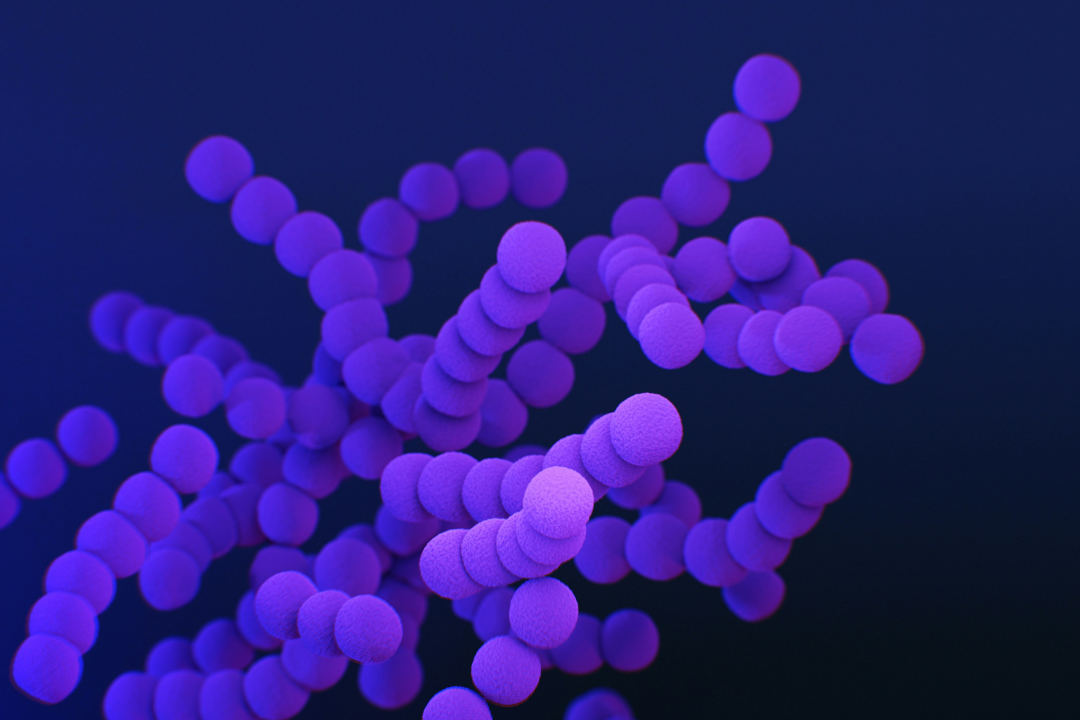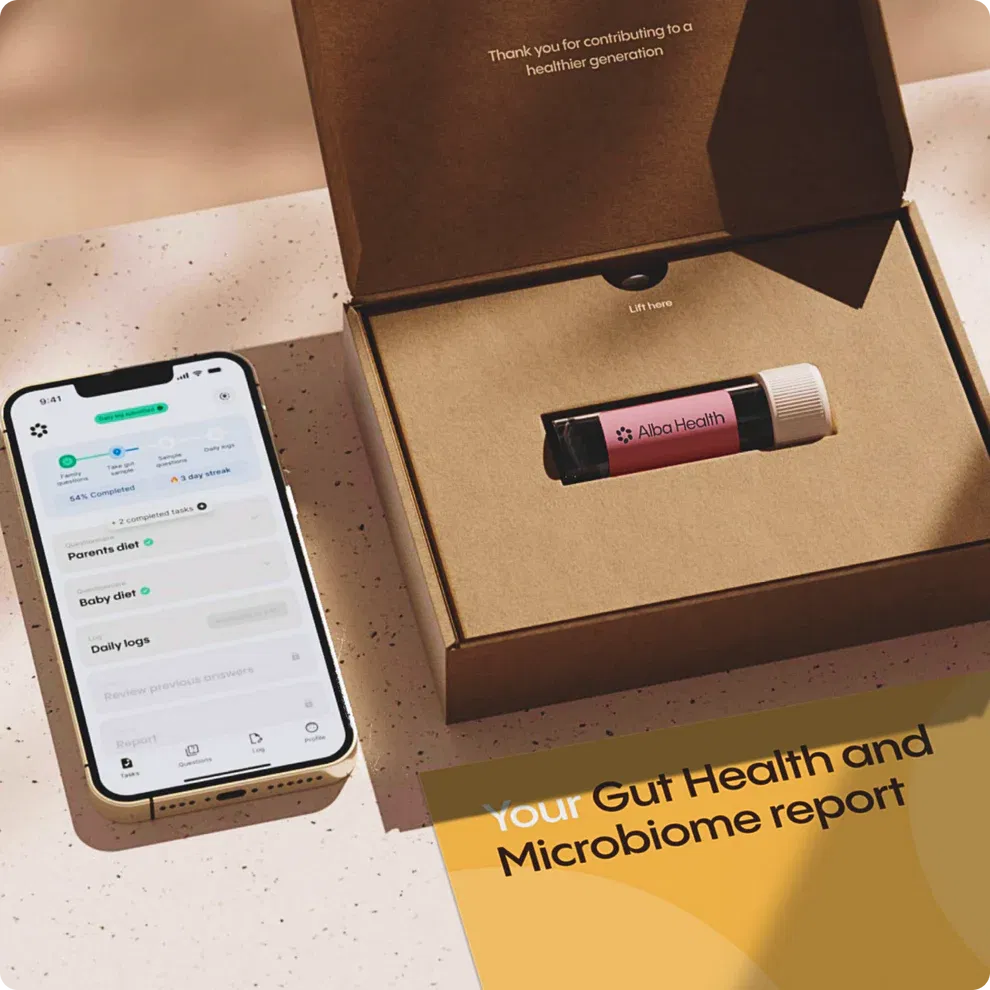The ultimate guide to probiotics for children

Summary:
- Probiotics are beneficial live bacteria that support your child’s gut health and overall wellbeing.
- They can help manage common health issues like eczema, constipation, colic, and diarrhea.
- Not all probiotics are the same – choosing the right strain based on your child’s needs is essential.
- Probiotics are generally safe for children of all ages when used appropriately.
- The effectiveness of probiotics is supported by clinical research.
As parents, we’re always looking for ways to improve our children’s health. One tool in supporting your child's overall wellbeing is probiotics. But what exactly are probiotics, and how can they help your child’s health? In this article, we break down the essential information you need to know about probiotics for children, and how they can support your little one’s gut health.
What are probiotics?
Probiotics are live microorganisms – often referred to as "good bacteria" – that provide health benefits when consumed in adequate amounts. These bacteria are naturally present in the gut and can also be found in certain foods and supplements [1].
Probiotics can be taken in different forms, such as:
- Capsules
- Powder
- Drops (ideal for younger children)
- Foods like kefir or yogurt
There are also related terms to know:
- Prebiotics: These are fibers that serve as food for probiotics [2]
- Postbiotics: What is left behind after digesting pre- and probiotics, which can include nutrients or other supportive components [3] that are produced when probiotics work in the gut.
- Synbiotics: A combination of prebiotics and probiotics, working together for enhanced benefits [4]
What do probiotics do for your child’s health?
Our gut is home to trillions of bacteria that help our bodies perform important functions. These bacteria help:
- Break down dietary foods and absorb nutrients to assist digestion[5].
- Produce beneficial compounds that support smooth food transit through the gut [6][7].
- Communicate with the immune system to regulate inflammation and boost immunity [8][9].
Normally, when we have a resilient, balanced gut microbiome, our body doesn’t need external support from probiotics. However, there are times when our gut could use a helping hand, and this is where probiotics come in. Probiotics typically don’t stay in the gut permanently. Instead, they temporarily enter, address the issue, and then leave once the problem is resolved [10].
Want to learn more about Alba and Children's Gut Health? Watch our free Instagram Lives with experts in child health.

How probiotics can help children
Probiotics have been clinically proven to support a variety of health concerns in children, including:
- Diarrhea (due to infections or antibiotics) [11]
- Eczema (skin inflammation) [12][13][14]
- Constipation [15]
- Irritable Bowel Syndrome (IBS) [16]
- Regurgitation [17] [18]
- Colic (fussiness or crying in infants)[19][20]
- Functional abdominal pain [21][22]
- And more…
Are probiotics safe for children of all ages?
Probiotics are generally safe for children, even newborns. For babies, probiotics in the form of drops can be a great option. However, it’s important to choose probiotics that are specifically approved for children and backed by clinical evidence.
When choosing a probiotic for your child, consider these factors:
- Age-appropriate form: Probiotics come in many different forms – powder, drops, chewable tablets, etc. Choose one that suits your child’s age and ability to consume it.
- Clinically tested for children: Make sure the probiotic is proven safe and effective for kids, with research supporting its use.
Is there science behind probiotics?
Not all probiotics are created equal. While some are backed by solid scientific research, others are not. When we say a product is "backed by science," it means there are studies that demonstrate its effectiveness for specific health benefits. At Alba Health, we only recommend probiotic products supported by credible research, including studies on their ability to address issues like eczema, constipation, and antibiotic-associated diarrhoea.
Probiotics can be a valuable tool in managing these conditions, but they are not a catch - all solution. It’s important to use probiotics as a targeted approach to support your child's health when needed.
What is the best probiotic for my child?
There is no one-size-fits-all answer to this question. Choosing the right probiotic depends on your child's unique health needs.
Here’s what to consider:
- Strain matters: Different probiotic strains have different benefits. Some strains support digestive health, while others may help with immune function or skin issues. Research the strains in a probiotic to make sure they match your child’s needs.
- Consider your child’s current gut health: We all have a unique microbiome. For some, taking more probiotics may cause bloating or discomfort. Testing can help determine if additional probiotics are necessary.
- Diet plays a role: A balanced diet rich in fiber (from fruits, vegetables, and grains) helps probiotics thrive [23]. Make sure your child’s diet supports their gut health to maximize the benefits of probiotics.
Alba Health: Your partner in gut health
At Alba Health, we’re committed to providing parents with the best advice to support their children’s gut health. We believe in personalized care, meaning the right probiotic for your child is the one that fits their specific health needs – not just any random supplement.
We don’t sell our own probiotics or earn commissions from recommending products. Our focus is on offering unbiased, science-backed guidance so you can make the best decision for your child’s health.
Why trust Alba Health?
Here’s why you can trust us:
- Our team has over 1,600 publications in gut health and child health research.
- In 2025, we won the Probiotic Pioneer Award at the world’s largest probiotics and microbiome event.
- Alba Health’s co-founder Professor Willem de Vos discovered Akkermansia muciniphila, a promising probiotic linked to heart and metabolic health, and has over 40 years of microbiome research experience.
- Our mission is to ensure your child’s gut health is supported with the best possible information, so you can make informed choices about probiotics and nutrition.
[1] Correction to: Exploring probiotic effector molecules and their mode of action in gut–immune interactions, FEMS Microbiology Reviews, Volume 47, Issue 5, September 2023, fuad055,
https://doi.org/10.1093/femsre/fuad055
[2] Zeratsky K. Probiotics and prebiotics: What you should know. Mayo Clinic. 2022. Available:
[3] MD TG, MD HR. What are postbiotics? Harvard Health. 2021. Available from:
https://www.health.harvard.edu/nutrition/what-are-postbiotics
[4] Gomez Quintero, David F et al. “The Future of Synbiotics: Rational Formulation and Design.”
Frontiers in microbiology vol. 13 919725. 22 Jul. 2022, doi:10.3389/fmicb.2022.919725
[5] A. Sarkar, J. Y. Yoo, S. V. O. Dutra, K. H. Morgan, and M. Groer, “The association between early-life gut microbiota and long-term health and diseases,” J. Clin. Med., vol. 10, no. 3, pp. 1–24, 2021, doi: 10.3390/jcm10030459.
[6] J. Tan, C. McKenzie, M. Potamitis, A. N. Thorburn, C. R. Mackay, and L. Macia, The Role of Short-Chain Fatty Acids in Health and Disease, 1st ed., vol. 121. Elsevier Inc., 2014. doi: 10.1016/B978-0-12-800100-4.00003-9.
[7] J. G. LeBlanc, C. Milani, G. S. de Giori, F. Sesma, D. van Sinderen, and M. Ventura, “Bacteria as vitamin suppliers to their host: A gut microbiota perspective,” Curr. Opin. Biotechnol., vol. 24, no. 2, pp. 160–168, 2013, doi: 10.1016/j.copbio.2012.08.005.
[8] S. P. Wiertsema, J. van Bergenhenegouwen, J. Garssen, and L. M. J. Knippels, “The interplay between the gut microbiome and the immune system in the context of infectious diseases throughout life and the role of nutrition in optimizing treatment strategies,” Nutrients, vol. 13, no. 3, pp. 1–14, 2021, doi: 10.3390/nu13030886.
[9] M. Henrick et al., “Bifidobacteria-mediated immune system imprinting early in life,” Cell, vol. 184, no. 15, pp. 3884-3898.e11, 2021, doi: 10.1016/j.cell.2021.05.030.
[10] Derrien, Muriel, and Johan E T van Hylckama Vlieg. “Fate, activity, and impact of ingested bacteria within the human gut microbiota.” Trends in microbiology vol. 23,6 (2015): 354-66. doi:10.1016/j.tim.2015.03.002
[11] Shornikova, A V et al. “Lactobacillus reuteri as a therapeutic agent in acute diarrhea in young children.” Journal of pediatric gastroenterology and nutrition vol. 24,4 (1997): 399-404. doi:10.1097/00005176-199704000-00008
[12] Winclove Probiotics. Preventing early onset eczema [Internet]. Winclove Probiotics; [cited 2024 Feb 8]. Available: https://www.wincloveprobiotics.com/wp-content/uploads/2022/02/Ecologic-PANDA.pdf
[13] Hattori K, Yamamoto A, Sasai M, Taniuchi S, Kojima T, Kobayashi Y, et al. Effects of administration of bifidobacteria on fecal microflora and clinical symptoms in infants with atopic dermatitis. Arerugi. 2003;52(1):20-30.
[14] Patole SK, Rao SC, Keil AD, Nathan EA, Doherty DA, Simmer KN. Benefits of Bifidobacterium breve M-16V Supplementation in Preterm Neonates - A Retrospective Cohort Study. PLoS One. 2016;11(3):e0150775.
[15] Tabbers MM, de Milliano I, Roseboom MG, Benninga MA. Is Bifidobacterium breve effective in the treatment of childhood constipation? Results from a pilot study. Nutr J. 2011;10:19.
[16] Cruchet Muñoz S, Verbeke Palma S, Lera Marqués L, Espinosa Pizarro MN, Malig Mechasqui J, Sorensen K. Effects of Bifidobacterium longum 35624 in Children and Adolescents with Irritable Bowel Syndrome. Nutrients. 2024;16(12):1967
[17] Indrio F, Riezzo G, Raimondi F, Bisceglia M, Filannino A, Cavallo L, Francavilla R. Lactobacillus reuteri accelerates gastric emptying and improves regurgitation in infants. Eur J Clin Invest. 2011;41(4):417-22.
[18] Garofoli F, Civardi E, Indrio F, Mazzucchelli I, Angelini M, Tinelli C, et al. The early administration of Lactobacillus reuteri DSM 17938 controls regurgitation episodes in full-term breastfed infants. Int J Food Sci Nutr. 2014;65(5):646-8.
[19] Szajewska H, Berni Canani R, Domellöf M, et al; ESPGHAN Special Interest Group on Gut Microbiota and Modifications. Probiotics for the Management of Pediatric Gastrointestinal Disorders: Position Paper of the ESPGHAN Special Interest Group on Gut Microbiota and Modifications. J Pediatr Gastroenterol Nutr. 2023:76(2):232-247
[20] Giglione E, Prodam F, Bellone S, Monticone S, Beux S, Marolda A, et al. The Association of Bifidobacterium breve BR03 and B632 is Effective to Prevent Colics in Bottle-fed Infants: A Pilot, Controlled, Randomized, and Double-Blind Study. J Clin Gastroenterol. 2016 Nov/Dec;50 Suppl 2, Proceedings from the 8th Probiotics, Prebiotics & New Foods for Microbiota and Human Health meeting held in Rome, Italy on September 13-15, 2015:S164-S167.
[21] Weizman, Z et al. A Randomized Controlled Trial of Lactobacillus reuteri DSM 17938 in Functional abdominal pain of childhood. SP-N-0102, Nutrition Trial symposia within the ESPGHAN program (9-12th of June, 2014 presented at 47th Annual Meeting of the European Society for Paediatric Gastroenterology, Hepatology and Nutrition, in Jerusalem).
[22] Weizman Z, Abu-Abed J, Binsztok M. Lactobacillus reuteri DSM 17938 for the Management of Functional Abdominal Pain in Childhood: A Randomized, Double-Blind, Placebo-Controlled Trial. J Pediatr. 2016;174:160-164.e1.
[23] Aziz, Tariq et al. “Elucidating the role of diet in maintaining gut health to reduce the risk of obesity, cardiovascular and other age-related inflammatory diseases: recent challenges and future recommendations.” Gut microbes vol. 16,1 (2024): 2297864. doi:10.1080/19490976.2023.2297864
Do you want to discover your child's gut health?
Alba's pioneering test helps you discover you child's gut health and guides you on how to improve it, with the help of a certified Nutrition & Health Coach.
Get Alba

